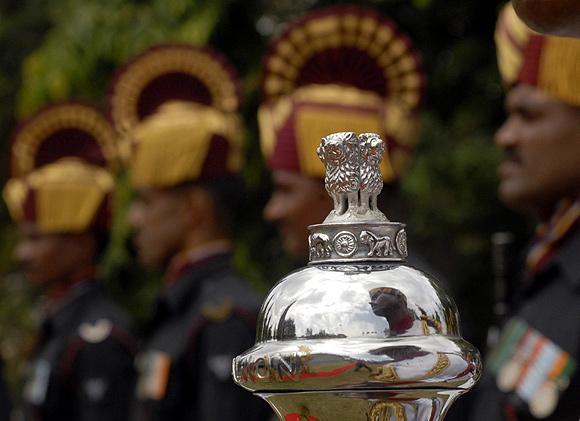
'These incidents of indiscipline in army units are happening with increased frequency, which is a dangerous trend and is a wake-up call for the senior leadership of the armed forces,' says Lieutenant General D B Shekatkar (retd).
In the first of a three-part series where senior army officers discuss the Indian Army's recent disciplinary crisis, General Shekatkar assures Rediff.com's Archana Masih that things are changing and that is why the Indian Army continues to be one of the best in the world.
Is the Indian Army seeing a disintegration of discipline? In the last year, there have been three instances of violent confrontation between officers and men in Leh, Gurdaspur and Samba that revealed a serious breach of discipline.
In Nyoma, Leh -- several men were injured in a clash between officers and jawans.
In Gurdaspur, Punjab -- officers and men had a confrontation after a training session.
In Samba, Jammu and Kashmir -- a jawan committed suicide reportedly because his leave wasn't sanctioned resulting in a standoff between officers and jawans.
In an organisation where discipline is the bedrock, these are not aberrations and need urgent action.
"It needs a serious rethink, needs reform, corrective measures. Also people's expectations are very high of the armed forces, we fail to understand that they come from the same society," says Lieutenant General D B Shekatkar, a retired soldier who once had 100,000 troops under his command and has served long tenures fighting insurgency as General Officer Commanding of the Four Corps in the Northeast and in Jammu and Kashmir.
In an interview to Rediff.com's Archana Masih seated in his Pune home under a photograph receiving then prime minister Rajiv Gandhi in Mizoram around the time of the signing of the Mizo Accord that ended a 20-year-old insurgency in the state, he spoke about the reasons behind the deterioration of discipline and the challenges it holds for the Indian Army's leadership.
In the last one year, there have been three separate incidents of standoffs between jawans and officers in the Indian Army. One did not hear of such cases before, is there some sort of disintegration of discipline in the army?
I wouldn't say that there is disintegration, but certainly these events give us an indication of the level of deterioration in discipline.
Indiscipline, whether in an individual or society or army, doesn't come suddenly. There are certain things that get accumulated over a period of time or when things go beyond control or when there is a momentary provocation.
The Leh incident started with somebody's wife being present there. Where was the need for the commanding officer to let the lady come when he was going for professional work -- for firing? He shouldn't have done that.
Assuming he had done it, then don't be selective for only army officers' wives, allow others' wives to also come. He may have done it unintentionally but this was a basic mistake.
Secondly, there is an increasing awareness in the soldiers who come from urban backgrounds. They are no longer illiterate which leads to a certain amount of disgruntlement -- that 'Oh, I'm a Class 12 pass boy and I am doing a sipahi's job and he is also Class 12, but went to NDA and became an officer'.
Therefore, the requirement in the young leadership of the armed forces and that means up to the rank of brigadier is to be very careful and sensitive to the changing environment in the country because soldiers are coming from the same environment.
There is greater responsibility on the leadership that is in touch with the troops every day -- and also on the higher leadership.
The dangerous thing was how did so many jawans muster the courage which means there is some lack of control in the environment.
Please
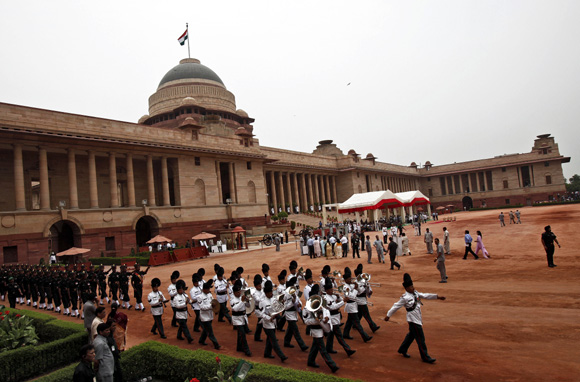
Yes, it was called a mutiny...
Almost. It did not reach that level. That so many mustered the courage is dangerous. It reflects poor command and control.
Take the case of Samba or Gurdaspur, these are happening with increased frequency which is a dangerous trend and is a wake up call for the senior leadership of the armed forces.
It is wrong to assume that the whole army has been corrupted, these are stray incidents, but at the same time we cannot take them as an aberration also, we should take them seriously.
The other aspect of these cases is connectivity of the communication system -- mobile phones, the Internet etc -- the minds are getting impacted.
Suppose I am a soldier, if there is a problem in my home it is communicated to me instantly, but I can't be there.
I was at the China border when my son was born and I could see him only after six months, today can I say that because I couldn't see my son, you also can't?
So there is a requirement of greater understanding of changing values and priorities. I think we are making a mistake at the senior level, our expectation is very high. We are not assimilating the changes in society.
There is a requirement for the higher leadership to understand this point.
Thirdly, they are watching the growing indiscipline in the police and paramilitary forces with whom they are working day and night.
In Kashmir, they are fighting terrorists. The jawan thinks I am a soldier and he is also a soldier, but in a different uniform (the police and paramilitary). He can do all sorts of things and yet get away and here I am...
When you get deployed in internal security situations for a longer duration, the adverse impact of society comes on you. The prolonged exposure of young soldiers and officers to civil society, the ills of civil society, the ills of the government mechanism, ills of the police administration, has an impact.
Also people's expectations are very high of the armed forces, we fail to understand that they come from the same society. There is certainly a decline in the threshold of tolerance, when I start perceiving everything is wrong -- my boss is not good etc and that's a dangerous thing for those who handle weapons 24x7.
It is this momentary provocation accumulated over a period of time that results in somebody killing his colleague, somebody firing at bosses, people getting together and gherao-ing their bosses.
People can say these are small issues, but the higher leadership and those politicians who are dealing with this should not take it lightly because these small incidents can one day erupt which will be beyond our control.
If you keep hiding things under the carpet to maintain your image and don't want to accept the truth, you are doing a great disservice to yourself by hiding a certain development in your organisation just because you want to project yourself.
Please
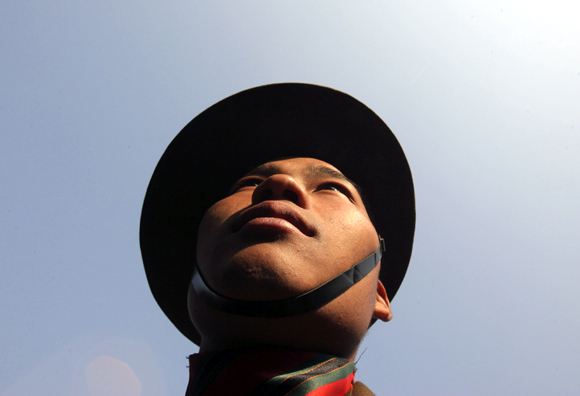
You are saying something that echoes in what former MP Manvendra Singh wrote in The Hindu -- 'The lure of higher ranks, however, requires that the record be spotless, so units do what they know best: Brush the mess under the carpet. Lapses are routinely covered up. And command failures remain unreported, or at best under-reported.'
Correct. He is right and I support it. Because everybody wants to show that nothing is happening in my command.
If you do that momentarily you will be able to cover it, but the termite that has gone deep is going to spread, a small cancer tumour if not removed will spread and one day explode.
Therefore, it is required from the senior leadership of the army and the ministry of defence not to hide it, you don't need to glorify or publicise, but when something is brought to your notice, accept it.
You should not only keep it open, but you must perceive to be open because in the philosophy of governance there is something known as perception management --- how people perceive you as an organisation, as a soldier, a general, a chief as PM, so the people's perception is very important.
The credibility of the government is going down and the army is part of the government. The same rule applies here also, therefore, I am repeating once again that in our desire to reflect ourselves as the holy cow we might be doing wrong to ourselves.
Therefore, it is the additional responsibility of the senior leadership to maintain the image of the people, the perception that they are the last resort, if we fail the consequences will be very dangerous.
Take, for example, the increasing shooting incidents in America. A good number of them are ex-army people. Why is it so? Because their minds got radicalised because they were in Vietnam or were in places where they were allowed to shoot in the national interest, the same people have come back and the tendencies remain.
We have to take a note from that -- that when we deploy the armed forces for internal security in the Northeast, Kashmir, young minds get radicalised. Now there is this additional factor that will have to be taken into account, particularly in the lower ranks, and in young officers.
The senior leadership has to be responsible. You can't say we are a large army of 1.3 million and we are deployed throughout the country because where you are deployed you have a system of command.
I won't say these are failures of leadership, but that these are challenges for the new leadership to face and counter these adverse impacts.
So there has to be a change of thinking...
Change in thinking, approach and attitude...
The army still seems to be entrenched in colonial traditions where there is a divide between officers and men, making it difficult to keep up with the changes outside and the aspirations of its jawans?
It is wrong to say that the army has a colonial hangover. Right from Independence we have not had any hangover. This is the fourth generation of Indian officers.
What we are doing today is all geared to the Indian requirement. There is no British tradition anymore in the Indian Army except the good tradition of fighting war.
The good tradition of strict discipline, the tradition of demanding utmost honesty -- if this is called a British hangover, then I welcome them to continue like this.
People say you must assimilate yourself to the Indian environment. What environment are we talking about? It cannot be the environment of indiscipline that is in the country, it cannot come into the army. Therefore, we have to isolate the army from these prevalent ills.
So we have to have discipline, a code of conduct, loyalty -- not to an individual, but to the nation, the organisation.
Loyalty and respect cannot be demanded by officers, you have to command respect. A soldier has to be loyal to the operational environment, the army and the nation.
Please
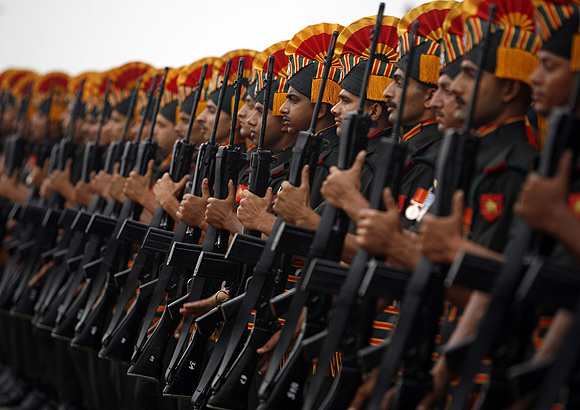
You mention that it is the senior leadership that needs to take steps to arrest this -- what is it that they need to do?
First of all, they need to set a personal example. If I want my subordinate officer to be loyal, honest, dependable, I must first exhibit these myself.
Second, set your own priorities. I must take people into confidence, listen to them and have free discussion before the orders are issued.
I cannot issue a command and expect that there will be blanket obedience. The acceptance of your thought process by your subordinates is also important.
A dictatorial regime cannot work now. It is different during war, you give an order that this has to be captured, and that order will have to be obeyed.
But before giving that order you have to take into account -- whether you are giving the right order or not. The orders issued must be practical and more practicable.
We should not get intoxicated by our command and authority.
Fourth, the senior leadership should remain close to the ground situation. What is happening at the lower level and in the country, society.
If young officers express their views, listen to them -- of course, you can't let them take the law into their own hands, but listen to them and then explain to them.
You have to convince your subordinates. I have gone through 22 years in the Northeast, Kashmir Punjab, I have never faced such an incident of indiscipline.
Even when I was in Kashmir during the worst phase of militancy in 1995-1996. Today there is 90 per cent improvement. I would explain to my officers and men that they were combating terrorism among their own people.
Ten per cent must have come from Pakistan, but the remaining were our own people. We were not accused of any violation of human rights under my command. There was no instance of assault.
The other thing is you must be accessible. Too much of barricading yourself under a hierarchal system where someone can't approach you till s/he crosses 3, 4 barriers!
It is connectivity between senior officers and the lower ranks that reduces the chances of conflict.
Is the divide too wide in the Indian Army hierarchy between the officer and a jawan?
It is not a divide. People may feel that a jawan should not approach a lieutenant general or a major general directly. My thinking is that the reason he is coming to you directly is because he probably feels that he has lost all avenues, he may be right or wrong, but listen to him.
You may not be convinced, but at least he will be satisfied that he has spoken to his superior.
The system of redressal of your grievances is very important. When you hit a wall, then you start getting frustrated. It doesn't mean that you hold a gram sabha every day, but people should have confidence that they can approach you.
That accessibility must ot only be maintained but perceived to be maintained.
The shortage of officers in the Indian Army results in officers shouldering far more responsibilities which does not give them as much time to interact and bond with jawans.
This also has a bearing on the officer-man relationship, doesn't it?
The shortage is certainly affecting our functioning system. There is a sense of comradeship when we are part of morning evening games etc with the soldiers.
When I was in command of my troops I had nothing else to do except command my troops. I had all the time with them.
Today the demands on the officers has increased, so the same officer may be holding 2, 3 posts and priorities are changing.
Ceremonials are also taking away a lot of time. They may not be important, but have become very important and more urgent.
At the same time what is alarming is that we have not been able to induct the required number of officers and hence this widening gap and where are these shortages felt? At the ground level.
You will not find any deficiency of the officer at the higher level. The deficiency is at the major, captain, lieutenant colonel, colonel level. They are the ones who are 24x7 with the troops, therefore there is a problem and there is a need.
It cannot only be left to the top brass of the armed forces, the government, the ministry of defence and more than that the bureaucrats who are handling this should be concerned. They can't say it is left to the army -- no, they are part of the system.
Today the environment is such that you need an officer everywhere, there is a requirement from within the army itself to delegate more responsibility to the subordinate ranks -- JCOs (junior commissioned officers) etc.
Responsibility and authority go together. You cannot hold anybody responsible unless you give him authority.
There is a need for rethinking in the army about the delegation of authority also. Because the education level of soldiers has increased, their knowledge of IT, management of finance has increased, so therefore there is a scope. We can put them to use in a better way.
There is no denying the fact that the shortage of officers is having an impact. In Kargil the maximum casualties was suffered by young officers. The same will hold good for future wars also.
If there is a deficiency in those ranks, then there is something seriously wrong.
Filling the deficiency of officers in the lower level is a bigger challenge. You have to make the environment within the organisation so good that people get attracted and this can't only be done by giving big advertisements like -- 'Do you have it in you?' etc, that is good showmanship. You have to improve the working within.
Please
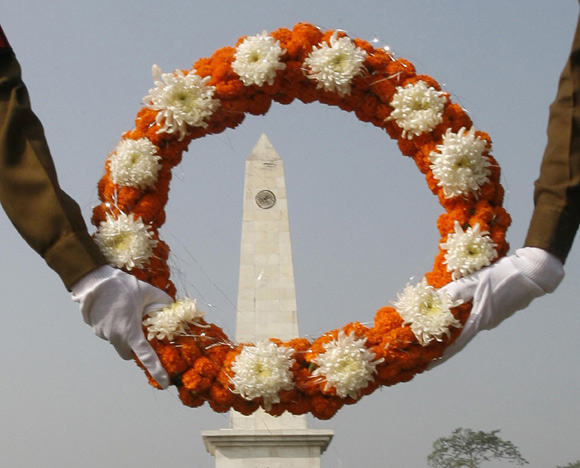
Even respect for the soldier in society is not what it used to be before and has eroded over the years.
I agree with you and it is because of societal changes. How many politicians do you see on Kargil Diwas? How many collectors will go?
But when a politician dies, hundreds go and get themselves photographed. These are your priorities.
When your priorities change, you will have to pay for it some day and pay dearly.
A nation that has not respected its armed forces has not gone very well in the history of humankind.
There has to be a change in attitudes and it doesn't mean that you have to pamper the soldier, but there are certain critical times when you should be seen with them.
How many pay their respects at the Amar Jawan Jyoti? Not many.
With incidents of corruption and scams like Adarsh etc, do the armed forces themselves need to look within? A lot of the respect for the armed forces has eroded because of these acts itself.
In the corruption cases, there is no doubt that the people who have been seen involved are brigadiers, lieutenant generals, major generals, even a chief's name has come -- right or wrong, I don't know but they are those who have been associated.
Did you find the name of a captain, or a sepoy? No it is not so.
They were the people who were at authority at that place. If they had exercised control, this would not have happened.
Certain cases that have come have been dealt very harshly. Strict military law has been applied.
If you find scam after scam, then you can't call it an aberration, then there is a connectivity. All these cannot be hidden from the media.
A few days ago somebody uploaded a brother officer's wife's pictures on the Internet. This is shocking! It was unheard of. That means our mentality is coming down to that level.
You can't stop people from using the Internet, but the fact that a subordinate officer thought of putting the superior's wife's picture shows the mentality.
Corruption is very shameful. The way we are coming into light. We are coming into light for selling land, giving no objection certificates, selling liquor, for using sub-standard rations, they may be individual cases, but they are there.
I must assure you that the present leadership of the army, the chief of army staff and his army commanders are taking all the opportunities to correct this.
His main thrust is that we cannot say these are aberrations and we cannot get away because even one case is big enough to malign the image of the army.
You cannot say the society is corrupt, therefore the army is corrupt, you should be able to maintain your individuality, only then you will be seen with respect that here is a segment of society that maintains its excellence.
This is our biggest challenge with the senior leadership of the armed forces.
Please
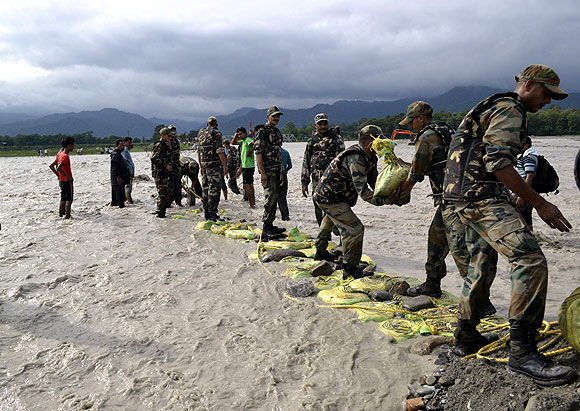
So you feel indiscipline is a serious problem, but this is certainly not a breakdown. But yet it is true that the officer-man relationship is not what it was before.
It needs a serious rethink, needs reform, corrective measures. It has not failed at all. If there is a war the Indian Army will perform like it has in the past.
We need a rethink on why these incidents are taking place. Today they are once a month, tomorrow they could be once a week so before we reach the stage why not arrest it?
That is the challenge to the senior leadership. If we say these are an aberration in a 1.3 million army, then we are bluffing ourselves.
The officer shortage has been there for 20 years now, why have we been unable to bridge it?
The government, society and governing mechanism has not been able to create an environment which will act as a magnet to attract people. You have to increase the strength of your magnetism from within.
We cannot attribute everything to society, that society is bad so everything is bad. That is just palming off the blame.
Today if you see a recruiting rally. There is a stampede to join as a sepoy. Why is the same not happening for officers ranks? There is improvement, but the deficiency is so much that it will take 10 years for vacancies to fill up.
You think the education and training these young cadets get in the academy may not be enough in today's changing time when they go out and command men as young as them and deal with their aspirations?
When young officers come into the National Defence Academy, we cannot reform them in that period.
We have to be able to tell them that if you are Class 12 pass, the soldier you command is also Class 12 pass. He may not speak good English, but he may be good in maths, science so when you deal with him, don't treat him as an illiterate subordinate, but as a colleague.
If this is inbuilt in their mind for one-and-a-half years I am sure when they go on the ground the perception will be totally different.
Secondly, we should not bring too much of army regimentation as soon as they join us, it should be a slow process. The transformation has to be gradual.
Things are changing every year there is reform. That is why the Indian Army -- in spite of all these so-called ills -- continues to be one of the best armies in the world.